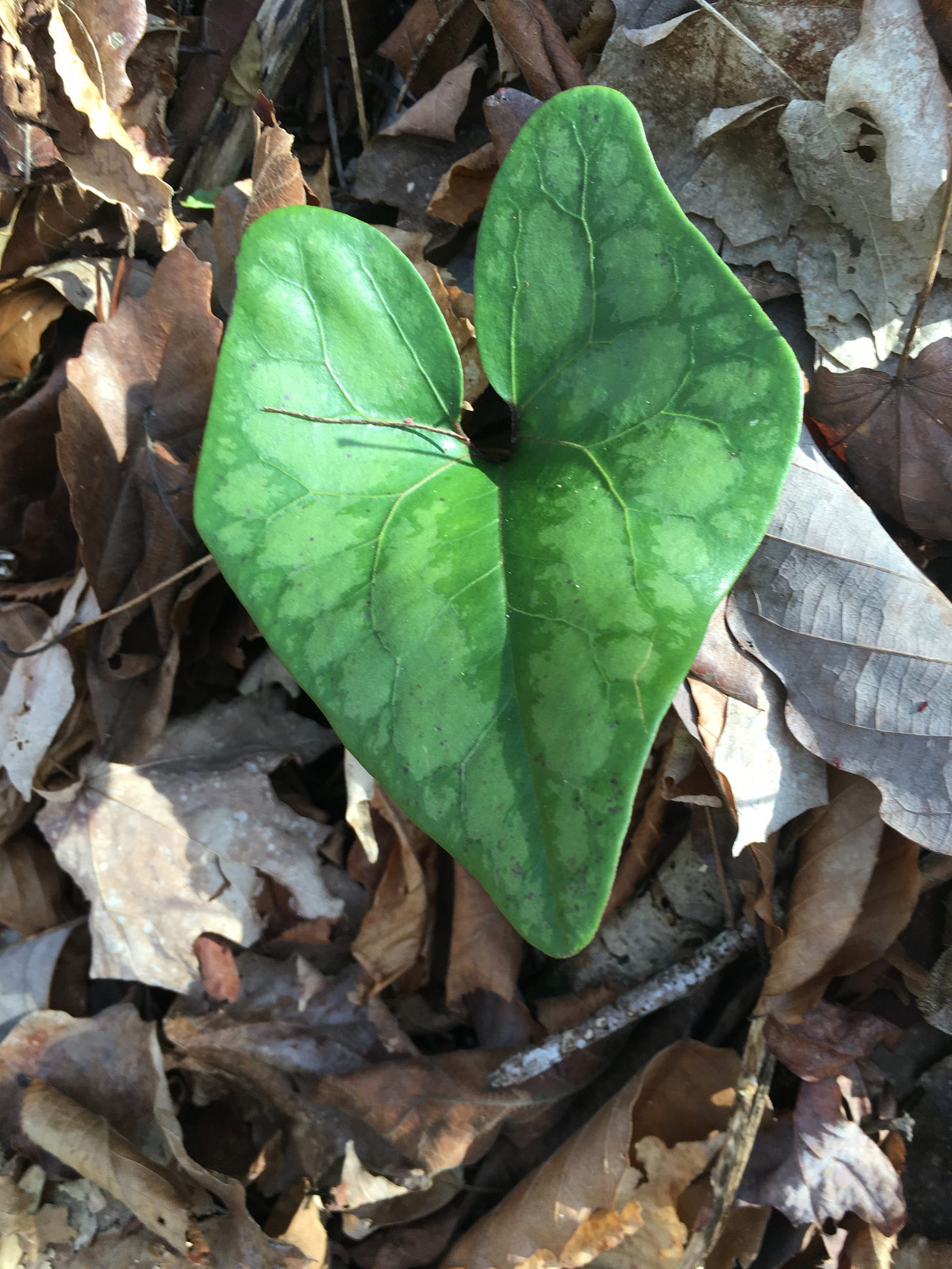Jeff Biggers: Spokesman for Appalachia
An earlier version of Jeff Biggers: Spokesman for Appalachia appeared in my Hellbender Press column, Nature’s Bookshelf, in volume 9, issue 3, July/August 2007. I am pleased to publish a substantially revised and updated version in Substack, illustrated with photos of Appalachian Wildflowers.
Wild Ginger, photographed at Audubon Acres by Ray Zimmerman.
“Appalachia needs no defense – it needs more defenders.” With these words, Jeff Biggers began his book, The United States of Appalachia, which launched his career as an award-winning author. Aside from his ten published books, Biggers has served as Writer in Residence at Iowa University and Playwright in Residence at Indiana University Northwest.
Biggers has written and produced plays In the United States and Italy, and his book, Damnatio Memoriae, is a play in English and Italian. According to his website, his stage experience also includes several monologues. He has given performances, lectures, and readings at over 100 universities nationwide.
His journalism work has appeared on National Public Radio and Public Radio International. Print pieces have appeared in the New York Times, the Washington Post, and several other papers.
Early in his publishing career, I was privileged to see Biggers speak at the University of Tennessee at Chattanooga and to interview him during his book signing tour in 2006. He spoke with eloquence and passion.
Mr. Biggers believes in the human connection to the land. He states that our music, writing, and culture depend upon that connection. His grandfather was a coal miner in Southern Illinois, and for him personally, that connection to the land is rooted in a 200-year-old cabin and a family cemetery, lost to the ravages of King Coal. Those losses give Biggers a feeling of kinship with the people of Appalachia.
The United States of Appalachia was 20 years in the making. During that time, Biggers worked as a freelance writer and radio correspondent here and abroad. Along the way, he edited the book No Lonesome Road, the story of Don West – poet, labor organizer, preacher, school superintendent, and co-founder of the Highlander Folk School.
West was near the end of a long life when Biggers met him while traveling in Appalachia and interviewing people for his journalism. He credits Don West as significantly influencing his life, writing, and The United States of Appalachia. The experience of traveling in Appalachia and interviewing local people also provided a foundation for his research on the region and led him to produce the book.
Biggers asserts that many American institutions began in Appalachia and bases that statement on years of regional research. The diverse group of writers he celebrates as Appalachians includes Pearl S. Buck, Cormack McCarthy, Willa Cather, Thomas Wolfe, Rebecca Harding Davis, James Still, and Edward Abbey. He also chronicles the innovations of several publishers, including Adolph Ochs of the Chattanooga Times and the New York Times.
Biggers points to the example set by Rosa Parks of the civil rights movement as one influenced by Appalachian innovators. Before refusing to give up her seat on a bus, Parks had attended a seminar at the Highlander Folk School of Tennessee. This school was instrumental in training the workers of the Civil Rights Movement.
Biggers waxes poetic about the contributions of Appalachians to America’s growth and development but does not gloss over the dangers posed by the mining economy. I asked him to comment on the Buffalo Creek mining disaster of 1972, in which an illegal dam holding back a coal slurry pond washed out. The flood killed 125 people, injured 1100, and left 4000 homeless.
Biggers stated that the mining companies have created hundreds of coal slurry ponds like the one that caused the Buffalo Creek flood and that people in the coalfields brace themselves for disasters that could happen in any wet, rainy year. As a journalist and a cultural historian, Biggers believes that another issue, mountaintop removal, must transcend the local/regional consciousness and become a national issue before it can be seriously addressed. Reports of mining disasters in America and abroad continue to surface in the news headlines.
Nevertheless, Biggers believes that Appalachia will continue to be a crossroads of innovators who can move America forward. “The people are an inspiration to me,” he said.
When Biggers returned to Chattanooga on March 24, 2007, for another book signing, the United States of Appalachia had been issued in paperback, and his new book, In the Sierra Madre, was released hardbound.
In the Sierra Madre was released in paperback later that year and is a chronicle of the year Biggers spent living and working with the Raramuri people of Mexico’s Copper Canyon country. He learned the story of these people by working with them in the fields, on wood-cutting expeditions, and indigenous construction sites. He also joined local musicians at celebrations where he introduced them to his banjo, entertained them with Appalachian tunes, and joined them as an accompanist.
Biggers continues to promote his books in readings and signings nationwide. His efforts succeed in an era when the burden of promotion largely falls on the author.
Bloodroot photographed at Audubon Acres by Ray Zimmerman.
Afterword: Jeff Biggers has published several books since this article went to press.
Biggers has served as a contributing editor of the Bloomsbury Review.
Reckoning at Eagle Creek: The Secret Legacy of Coal, January 1, 2009, Shawnee Books.
State Out of the Union: Arizona and the Final Showdown on the American Dream, September 25, 2012, Bold Type Books.
Damnatio Memoriae A play in English and Italian, September 1, 2015, Wings Books.
The Trials of a Scold: The Incredible True Story of Writer Anne Royal, November 7, 2017, Thomas Duane Books.
Resistance: Reclaiming an American Tradition, July 3, 2018.
In Sardinia: An Unexpected Journey in Italy, May 23, 2023, Melville House.
Violet, photographed at Audubon Acres by Ray Zimmerman
Published Works Mentioned in the Original Article
Don West: No Lonesome Road, Selected Prose and Poems, Edited by Jeff Biggers and George Brosi and with an Introduction by Jeff Biggers
Don West sprang from a Southern Appalachian family to become a populist poet, teacher, minister, and labor organizer. With Myles Horton, he co-founded the Highlander Folk School and worked throughout his life for the rights of people with low incomes. He was also an early spokesperson for civil rights. In the introduction, Biggers gives a brief biographical sketch tracing the education and history of Don West, a neglected literary voice of the South. He compares West to the Northern populist poet Carl Sandburg and credits West as a significant influence on his writing.
The United States of Appalachia: How Southern Mountaineers Brought Independence, Culture, and Enlightenment to America
Biggers traces the contributions of Southern Appalachian people to the American Revolution, the publishing industry, the desegregation movement, American Indian rights, and the cultural growth of the nation. His true stories place Appalachian people in the vanguard of the nation’s development.
This book is based on Biggers’s year in the Sierra Madre. He spent time living and working with the Raramuri people of Mexico’s Copper Canyon country, which was also the setting of the Humphrey Bogart film Treasure of the Sierra Madre. It was based on the novel with the same title, written by the mysterious B. Traven.
Aside from documenting the Raramuri culture in the village Mawichi, Biggers included descriptions of the villagers’ interaction with Spanish-speaking Mexicans, missionaries, and tourists. He also describes the introduction of Raramuri musicians there to his banjo and some Appalachian tunes. The narrative is dense with history, natural history, and a view of American/Mexican diplomacy and politics.






